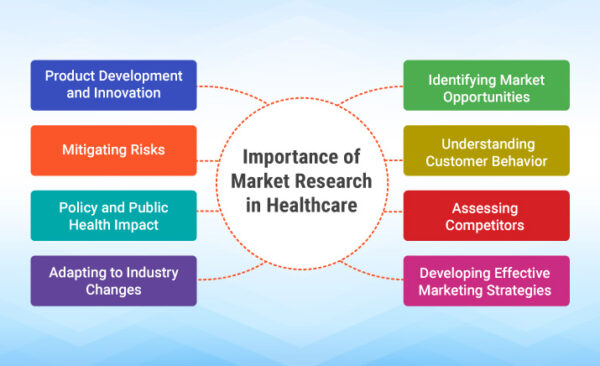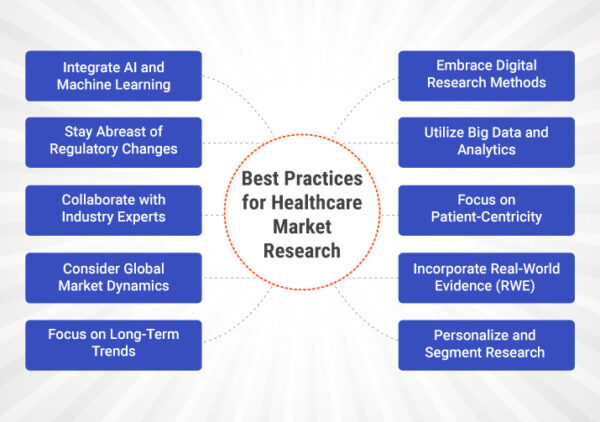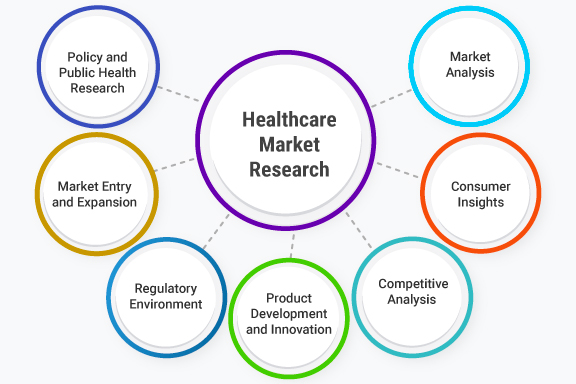What is Healthcare Market Research?
Healthcare market research is defined as the systematic collection, analysis, and interpretation of data and information related to the healthcare industry. It involves studying various aspects of the market, including healthcare products, services, providers, consumers, and trends, to gain insights and make informed decisions.
Healthcare market research aims to understand the dynamics of the healthcare sector, identify opportunities, assess competition, and evaluate the viability of new products or services. It provides valuable information for healthcare organizations, pharmaceutical companies, medical device manufacturers, insurers, policymakers, and other stakeholders.
Key components of healthcare market research include:
- Market Analysis: This involves studying the size, growth rate, and trends of the healthcare market, including specific segments such as pharmaceuticals, medical devices, biotechnology, hospitals, and clinics. Market analysis helps identify target audiences and market potential.
- Consumer Insights: Understanding consumer behavior, preferences, and needs is crucial in healthcare. Market research collects data on patient demographics, healthcare utilization patterns, satisfaction levels, and decision-making processes. These insights inform the development of effective marketing strategies and patient-centric solutions.
- Competitive Analysis: Evaluating competitors is essential to gain a competitive advantage. Healthcare market research assesses competitor products, pricing, distribution channels, marketing strategies, and market share. This information helps healthcare organizations position themselves effectively and differentiate their offerings.
- Product Development and Innovation: Healthcare market research aids in identifying unmet needs, emerging trends, and areas for innovation. It provides insights into product design, features, pricing, and potential market acceptance. This helps in developing and launching successful healthcare products and services.
- Regulatory Environment: Healthcare is subject to extensive regulations and compliance requirements. Market research helps organizations stay informed about regulatory changes, anticipate their impact, and ensure compliance when developing and marketing healthcare products.
- Market Entry and Expansion: When entering new markets or expanding existing operations, market research helps assess the feasibility, market potential, and competition. It provides valuable insights into local healthcare systems, reimbursement mechanisms, cultural factors, and customer preferences.
- Policy and Public Health Research: Healthcare market research also extends to public health initiatives, policy analysis, and health outcome assessments. It helps policymakers and public health organizations understand the impact of interventions, evaluate healthcare programs, and shape evidence-based policies.
Importance of Market Research in Healthcare

Healthcare market research holds significant importance in the healthcare industry for several reasons:
- Identifying Market Opportunities
Healthcare market research helps healthcare organizations identify and assess new market opportunities. By understanding patient needs, emerging trends, and gaps in existing products or services, organizations can develop innovative solutions that meet market demand. The result of this can be a boost in revenue and expansion.
- Understanding Customer Behavior
Healthcare market research provides insights into patient preferences, behaviors, and decision-making processes. Understanding these factors helps organizations tailor their offerings to better meet customer needs, improve patient satisfaction, and enhance the overall patient experience.
- Assessing Competitors
Effective healthcare market research enables healthcare organizations to analyze competitors, their products, and their market positioning. This information helps identify competitive advantages, differentiate offerings, and develop effective marketing strategies to gain a competitive edge.
- Developing Effective Marketing Strategies
By conducting healthcare market research, healthcare organizations can gain insights into target audiences, their demographics, and their preferences. This information is crucial for developing targeted marketing campaigns, selecting appropriate communication channels, and delivering personalized messages to effectively reach and engage customers.
- Product Development and Innovation
Healthcare market research plays a crucial role in the development of new healthcare products and services. By understanding market needs, preferences, and trends, organizations can design products that align with customer expectations, enhance patient outcomes, and achieve market success.
- Mitigating Risks
Healthcare market research helps organizations make informed decisions and mitigate risks associated with new product launches, market entry, or expansion. It provides data and insights that support evidence-based decision-making, reducing the likelihood of costly mistakes or unsuccessful ventures.
- Policy and Public Health Impact
Healthcare market research is essential for policy analysis, public health initiatives, and assessing the impact of healthcare interventions. It helps policymakers understand the effectiveness and feasibility of various healthcare programs, shape evidence-based policies, and improve public health outcomes.
- Adapting to Industry Changes
The healthcare industry is constantly evolving, driven by technological advancements, regulatory changes, and shifting patient needs. Market research helps organizations stay updated on industry trends, adapt to changes, and proactively respond to new challenges and opportunities.
Learn more: What is Qualitative Research?
How to Conduct Healthcare Market Research: 10 Key Steps
Conducting healthcare market research involves a systematic approach to gathering, analyzing, and interpreting data. Here are key steps to follow:
1. Define Research Objectives: Clearly define the goals and objectives of your healthcare market research. Identify the specific questions you want to answer, such as understanding patient preferences, assessing market demand for a new product, or evaluating competitor strategies.
2. Determine Research Methodology: Select appropriate research methodologies based on your objectives. Common methods in healthcare market research include surveys, interviews, focus groups, observational studies (qualitative and quantitative), and secondary data analysis. Consider the pros and cons of each method and choose the most suitable approach or a combination of methods.
3. Identify Target Audience: Define your target audience, such as patients, healthcare professionals, or specific demographic groups. Identify the sample size and selection criteria for your research participants, ensuring they represent your target market accurately.
4. Data Collection: Implement your chosen research methodology to collect data. If conducting surveys or interviews, design questionnaires or interview guides that address your research objectives. Use reliable data collection tools and techniques to ensure data accuracy.
5. Data Analysis: Once data is collected, analyze it to derive meaningful insights. Use statistical analysis, qualitative coding techniques, or software tools to analyze survey responses, interview transcripts, or observational data. Explore and analyze patterns, trends, and significant discoveries that align with your research objectives.
6. Interpretation and Insights: Interpret the analyzed data to generate actionable insights. Identify the implications of your findings on product development, marketing strategies, or market opportunities. Connect the dots between the data and the larger healthcare landscape to derive meaningful conclusions.
7. Reporting and Presentation: Prepare a comprehensive report summarizing your research findings, insights, and recommendations. Present the data in a clear and visually appealing manner, using charts, graphs, or tables to enhance understanding. Share the report with stakeholders, decision-makers, or clients.
8. Implementation and Decision-Making: Use the research findings to inform strategic decision-making. Implement the insights gained from market research into product development, marketing campaigns, pricing strategies, or market entry plans. Continuously monitor and evaluate the impact of your decisions to refine your approach over time.
9. Ethical Considerations: Ensure that your healthcare market research complies with ethical standards, such as obtaining informed consent from participants, protecting participant privacy, and handling data securely. Adhere to relevant regulations and guidelines, such as HIPAA in the United States, when dealing with healthcare data.
10. Continuous Market Monitoring: Healthcare market research is an ongoing process. Keep track of market dynamics, industry trends, and customer preferences through continuous monitoring. Stay updated on new research methodologies, technologies, and regulatory changes that may impact your research and decision-making process.
Learn more: What is Quantitative Research?
Top 10 Best Practices for Healthcare Market Research in 2023

In 2023, healthcare market research continues to evolve with new trends, technologies, and challenges. Here are some best practices to consider for conducting healthcare market research:
1. Embrace Digital Research Methods
Leverage digital tools and technologies for data collection, analysis, and participant engagement. Online surveys, social media listening, virtual focus groups, and mobile research apps can provide efficient and cost-effective means to gather data from a broader audience.
2. Utilize Big Data and Analytics
Leverage big data and advanced analytics techniques to gain deeper insights into healthcare trends, patient behaviors, and outcomes. Explore electronic health records, claims data, wearables, and other sources to uncover patterns and correlations that can inform market research strategies.
3. Focus on Patient-Centricity
Put patients at the center of your research. Understand their needs, preferences, and experiences to develop patient-centric healthcare solutions. Use patient journey mapping and patient feedback mechanisms to gain a comprehensive understanding of their healthcare decision-making processes.
4. Incorporate Real-World Evidence (RWE)
Consider integrating real-world evidence into your healthcare market research. RWE involves the collection and analysis of data from routine clinical practice, electronic health records, claims databases, and patient registries. This can provide insights into treatment outcomes, comparative effectiveness, and safety profiles.
5. Personalize and Segment Research
Recognize the diversity within the healthcare market and tailor your research approach accordingly. Segment your target audience based on demographic, geographic, behavioral, or psychographic factors. Personalize research surveys, messages, and interventions to address specific audience segments.
6. Integrate AI and Machine Learning
Explore the use of AI and ML techniques to analyze large volumes of healthcare data efficiently. These technologies can help identify patterns, predict trends, and automate data analysis processes, saving time and enhancing the accuracy of insights.
7. Stay Abreast of Regulatory Changes
Stay updated on regulatory changes and compliance requirements that impact healthcare market research. Understand the implications of regulations like GDPR (General Data Protection Regulation) and HIPAA (Health Insurance Portability and Accountability Act) to ensure data privacy and protection.
8. Collaborate with Industry Experts
Engage with healthcare industry experts, consultants, or research partners who possess domain knowledge and expertise. Collaborating with professionals who understand the intricacies of the healthcare market can enhance the quality and relevance of your research.
9. Consider Global Market Dynamics
If conducting research in multiple countries or regions, account for cultural, economic, and regulatory differences. Adapt your research approach to account for local market nuances and tailor your strategies accordingly.
10. Focus on Long-Term Trends
Look beyond short-term market fluctuations and focus on long-term trends and emerging healthcare developments. Anticipate future needs and market demands to proactively position your organization or products for success.
Learn more: What is Market Research?
Most Recent Blogs
Explore the latest innovation insights and trends with our recent blog posts.










